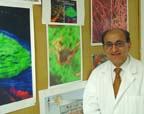10 Jul Study Identifies Pathway Linking Obesity With Pancreatic Cancer Progression
MedicalResearch.com Interview with;
Dr. Rakesh K. Jain, PhD
A.W.Cook Professor of Radiation Oncology (Tumor Biology)
Director, E.L. Steele Laboratory
Department of Radiation Oncology
Harvard Medical School and
Massachusetts General Hospital
Boston, MA 02114
MedicalResearch.com: What is the background for this study? What are the main findings?
Response: Pancreatic ductal adenocarcinoma (PDAC) is the fourth leading cause of cancer death worldwide, and more than half of patients diagnosed with PDAC are overweight or obese. Among patients with PDAC, obesity more than doubles the already high risk of death, and our work aims to reveal the underlying mechanisms. Specifically, we identified that obesity increases desmoplasia – an accumulation of connective tissue and inflammation – hallmark of Pancreatic ductal adenocarcinoma and discovered underlying mechanisms.
In our report published online in Cancer Discovery, we describe how interactions among fat cells, immune cells and connective tissue cells in obese individuals create a microenvironment that promotes tumor progression while diminishing the response to chemotherapy. We demonstrated the negative impact of obesity on numerous aspects of tumor growth, progression and treatment response in several animal models of pancreatic ductal adenocarcinoma and confirmed some of our findings in samples from cancer patients. Along with finding that tumors from obese mice or patients exhibited elevated levels of adipocytes or fat cells and of desmoplasia, both of which fuel tumor progression and interfere with treatment response, we identified the underlying causes.
The elevated desmoplasia in obese mouse models of PDAC was caused by the activation of pancreatic stellate cells through the angiotensin II type-1 receptor (AT1) signaling pathway. This activation was induced by interleukin-1 beta (IL-1ß) produced by fat cells as well as the immune cells called neutrophils within tumors. Inhibiting AT1 signaling with losartan, which is used clinically to treat hypertension, or the blockade of IL-1ß reduced obesity-associated desmoplasia and tumor growth and increased the response to chemotherapy in the obese mouse model but not in normal weight animals. Analysis of tumors from human PDAC patients revealed increased desmoplasia and fat deposits in samples from obese patients, and data from more than 300 patients showed that excess weight was associated with a reduction in patients.
MedicalResearch.com: What should readers take away from your report?
Response: Previous research by the MGH team and others has shown that Pancreatic ductal adenocarcinoma is characterized by elevated desmoplasia – with an overproduction of extracellular matrix tissue by pancreatic stellate cells – which both promotes the survival and migration of cancer cells and blocks the penetration of drugs into tumors. Obesity itself is known to contribute to desmoplasia, with the expansion of fat tissue leading to inflammation and fibrosis and an accumulation of fat within the normal pancreas, which also causes inflammation. With the majority of pancreatic cancer patients being overweight or obese at diagnosis, uncovering potential therapeutic targets within the mechanisms associating obesity with poor cancer prognoses is the first step towards developing remedies that could disrupt this association and significantly improve patient outcome. Targeting inflammation and fibrosis holds the promise to improve the clinical outcome of this major group of Pancreatic ductal adenocarcinoma patients
MedicalResearch.com: What recommendations do you have for future research as a result of this study?
Response: Understanding the way that obesity affects pancreatic cancer may help us identify biomarkers – such as body weight and increased levels of tumor fibrosis – to select patients for whom AT1 blockers or IL-1ß antibodies would be most beneficial. Since FDA-approved versions of both agents are readily available, this strategy could be readily translated into the clinic. In addition, incorporating body weight into the design of preclinical studies could better account for the lack of response to conventional chemotherapeutical drugs seen in patients.
MedicalResearch.com: Is there anything else you would like to add?
Response: Fukumura is an associate professor of Radiation Oncology, and Jain is the Cook Professor of Radiation Oncology (Tumor Biology) at Harvard Medical School. Jain is among three recipients of the 2013 National Medal of Science, which was awarded in May 2016. This year Incio received the prestigious American Association of Cancer Research Scholar-in-Training award, the European Association for Cancer Research meeting award and a poster of distinction award at the annual MGH Celebration of Science for his work on obesity and cancer in the Steele Laboratories. Additional co-authors of the Cancer Discovery paper include Hao Liu, MD, Priya Suboj, PhD, Yves Boucher, PhD, Shan Chin, MSc, and other members of the Steele Laboratories. The study also involved collaboration with researchers in the MGH Departments of Pathology, Medicine and Surgery.
This work was supported by National Institutes of Health grants CA80124, CA85140, CA96915, CA115767, and CA126642, along with support from the Lustgarten Foundation and the Foundation for Science and Technology of Portugal. MGH has filed a patent application based on this finding, which has been licensed to Xtuit Pharmaceuticals – a company co-founded by Jain.
MedicalResearch.com: Thank you for your contribution to the MedicalResearch.com community.
Citation:
Obesity-induced inflammation and desmoplasia promote pancreatic cancer progression and resistance to chemotherapy
Joao Incio, Hao Liu, Priya Suboj, Shan M. Chin, Ivy X. Chen, Matthias Pinter,Mei R. Ng,Hadi T. Nia, Jelena Grahovac, Shannon Kao, Suboj Babykutty,Yuhui Huang, Keehoon Jung, Nuh N. Rahbari, Xiaoxing Han, Vikash P. Chauhan,John D. Martin, Julia Kahn, Peigen Huang, Vikram Desphande,James Michaelson, Theodoros P. Michelakos, Cristina R. Ferrone, Raquel Soares,Yves Boucher, Dai Fukumura, and Rakesh K. Jain
Cancer Discov CD-15-1177; Published OnlineFirst May 31, 2016; doi:10.1158/2159-8290.CD-15-1177
Note: Content is Not intended as medical advice. Please consult your health care provider regarding your specific medical condition and questions.
More Medical Research Interviews on MedicalResearch.com
Last Updated on July 10, 2016 by Marie Benz MD FAAD

